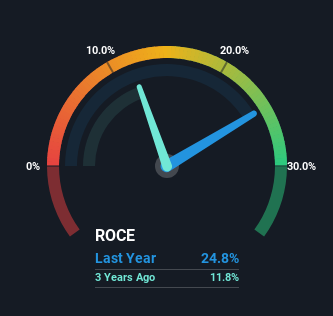- Australia
- /
- Consumer Services
- /
- ASX:IEL
IDP Education (ASX:IEL) Will Be Hoping To Turn Its Returns On Capital Around
If you're not sure where to start when looking for the next multi-bagger, there are a few key trends you should keep an eye out for. One common approach is to try and find a company with returns on capital employed (ROCE) that are increasing, in conjunction with a growing amount of capital employed. If you see this, it typically means it's a company with a great business model and plenty of profitable reinvestment opportunities. Having said that, while the ROCE is currently high for IDP Education (ASX:IEL), we aren't jumping out of our chairs because returns are decreasing.
What Is Return On Capital Employed (ROCE)?
For those that aren't sure what ROCE is, it measures the amount of pre-tax profits a company can generate from the capital employed in its business. Analysts use this formula to calculate it for IDP Education:
Return on Capital Employed = Earnings Before Interest and Tax (EBIT) ÷ (Total Assets - Current Liabilities)
0.25 = AU$246m ÷ (AU$1.3b - AU$289m) (Based on the trailing twelve months to December 2023).
So, IDP Education has an ROCE of 25%. That's a fantastic return and not only that, it outpaces the average of 7.7% earned by companies in a similar industry.
See our latest analysis for IDP Education

Above you can see how the current ROCE for IDP Education compares to its prior returns on capital, but there's only so much you can tell from the past. If you're interested, you can view the analysts predictions in our free analyst report for IDP Education .
How Are Returns Trending?
When we looked at the ROCE trend at IDP Education, we didn't gain much confidence. To be more specific, while the ROCE is still high, it's fallen from 39% where it was five years ago. Although, given both revenue and the amount of assets employed in the business have increased, it could suggest the company is investing in growth, and the extra capital has led to a short-term reduction in ROCE. If these investments prove successful, this can bode very well for long term stock performance.
On a side note, IDP Education has done well to pay down its current liabilities to 23% of total assets. That could partly explain why the ROCE has dropped. What's more, this can reduce some aspects of risk to the business because now the company's suppliers or short-term creditors are funding less of its operations. Since the business is basically funding more of its operations with it's own money, you could argue this has made the business less efficient at generating ROCE.
The Key Takeaway
Even though returns on capital have fallen in the short term, we find it promising that revenue and capital employed have both increased for IDP Education. In light of this, the stock has only gained 27% over the last five years. Therefore we'd recommend looking further into this stock to confirm if it has the makings of a good investment.
If you're still interested in IDP Education it's worth checking out our FREE intrinsic value approximation for IEL to see if it's trading at an attractive price in other respects.
If you want to search for more stocks that have been earning high returns, check out this free list of stocks with solid balance sheets that are also earning high returns on equity.
New: AI Stock Screener & Alerts
Our new AI Stock Screener scans the market every day to uncover opportunities.
• Dividend Powerhouses (3%+ Yield)
• Undervalued Small Caps with Insider Buying
• High growth Tech and AI Companies
Or build your own from over 50 metrics.
Have feedback on this article? Concerned about the content? Get in touch with us directly. Alternatively, email editorial-team (at) simplywallst.com.
This article by Simply Wall St is general in nature. We provide commentary based on historical data and analyst forecasts only using an unbiased methodology and our articles are not intended to be financial advice. It does not constitute a recommendation to buy or sell any stock, and does not take account of your objectives, or your financial situation. We aim to bring you long-term focused analysis driven by fundamental data. Note that our analysis may not factor in the latest price-sensitive company announcements or qualitative material. Simply Wall St has no position in any stocks mentioned.
About ASX:IEL
IDP Education
Engages in the placement of students into education institutions in Australia, the United Kingdom, the United States, Canada, New Zealand, and Ireland.
Reasonable growth potential with adequate balance sheet.
Market Insights
Community Narratives




